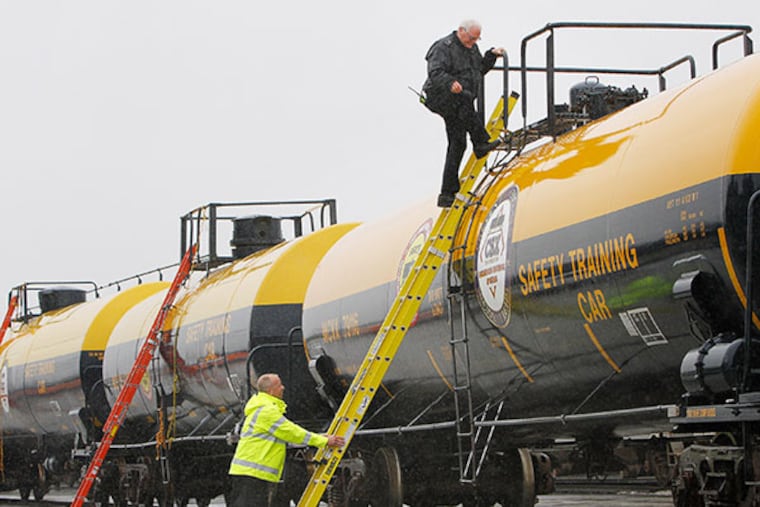CSX brings Safety Train to Phila. for first responders
CSX Corp. has been bringing its Safety Train to Philadelphia for a decade to teach first responders about railroad equipment. This week's visit was anything but routine.

CSX Corp. has been bringing its Safety Train to Philadelphia for a decade to teach first responders about railroad equipment. This week's visit was anything but routine.
Amid a nationwide surge in traffic from domestic oil fields to refineries, several fiery accidents, and a January derailment of a CSX oil train in Philadelphia, rail safety has taken on a new level of urgency and public awareness.
"If a catastrophe does happen, we're all working hand in hand," said Councilman Kenyatta Johnson, who visited the Safety Train on Friday at the CSX rail yard at 36th and Moore Streets in South Philadelphia.
Over the last week, about 100 emergency responders explored four tank cars, two classrooms, and a flat car equipped with tank-car valves and fittings that CSX hauled into the yard.
First responders from the Coast Guard and the University of Pennsylvania attended the one-day sessions. The Philadelphia Fire Department sent more than 80 firefighters, including all its hazardous materials specialists. Lunch was included.
"It's hands-on," said Joseph McGraw, a Philadelphia deputy fire chief. "These are the real trains we're going to be dealing with. We're actually out there with the real capping devices, the real plugging devices, you would use."
Some activists who say the nation is unprepared for the dangers of transporting so much combustible material by rail dismiss the CSX training as inconsequential.
"It's a public relations stunt to make it look like they're doing a significant thing," said Fred A. Millar, an independent rail consultant from Virginia and industry critic.
CSX says its train travels to 30 to 40 cities a year and serves a purpose. The training was enhanced recently to focus more on crude-oil accidents.
"This is a very big part of our training program, and solidifies the partnership we have with first responders," said Carla Groleau, a spokeswoman for CSX, which is based in Jacksonville, Fla.
McGraw, the Philadelphia fire official, says firefighters can reinforce relations with railroad officials like Michael Austin, a CSX hazardous materials special agent. They describe their discussions as friendly, but frank.
"We talk shop about other incidents, what went right and what went wrong," said McGraw. "We want to hear how they handled it, how they screwed it up. Lessons learned, all that kind of stuff."
Austin supervised the CSX response to a Jan. 21 derailment of six oil cars on a bridge spanning the Schuylkill. No oil was spilled and nobody was injured, but several tank cars marooned in Center City for a week served as a visual public reminder of the crude-oil traffic.
"Most people don't realize how much rail traffic is going on in Philadelphia," McGraw said. "You see it, but you don't see it, because it's moving so smoothly."
McGraw says he is not alarmed by the large volumes of crude oil moving through the area, including two CSX trains a day heading to the Philadelphia Energy Solutions refinery in South Philadelphia.
"There are lots of hazardous materials moving through the city," he said.
CSX held a similar session recently in Delaware County, where Enbridge Inc. this month opened the Eddystone Rail terminal.